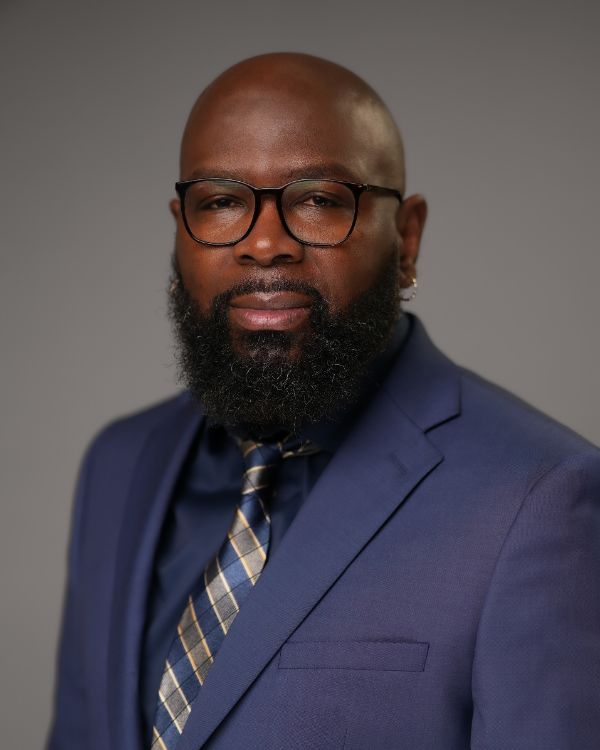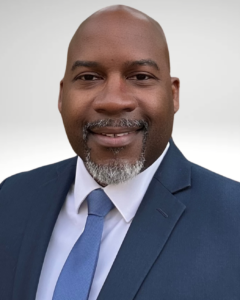“I treat everyone with respect, not because of who they are, but because of who I am. You never know what someone’s carrying, and kindness might be the only calm they feel all day.”
For 25 years, Leonard Shinhoster has been a steady, compassionate presence at Alexander Youth Network. His leadership is more than a job title. It’s a calling. It’s connection. It’s legacy.
Leonard first joined the agency in 1999. At the time, he was working at another organization when a close friend and therapist named Sandy Mooney encouraged him to consider Alexander. “She saw something in me,” he said. “She believed in the work, and she believed in me.” Although Sandy has since passed, Leonard says her impact still fuels his passion every day.
He started out as a Behavioral Health Counselor and has grown into many roles over the years. With each new position, he found new ways to support kids, families, and the staff around him, while staying rooted in what matters most: helping others heal and feel whole again.
Finding His Path
Leonard’s gift for working with young people didn’t start at Alexander. He was on a basketball scholarship at Queens University when he began volunteering with children and adults with special needs. It didn’t take long for something to click.
“That volunteer work lit a fire in me that’s still burning today,” he said. “I realized I had a heart for people who are often forgotten or misunderstood. That’s when I knew I’d found my purpose.”
Putting Families First
Now, as Vice President of Program Operations, Leonard leads programs that serve youth in some of the most intensive levels of care. But no matter how high he’s climbed, his focus is still on family.
“Family involvement starts from the very beginning,” he explained. “We don’t just tell parents what to expect, we walk with them. We help them feel informed, involved, and understood.”
One thing he emphasizes often is that families are not on the sidelines. “They’re partners in the process. Without them, our work is incomplete.”
Changing the Way People See Residential Care
Leonard is passionate about changing the way people think about structured therapeutic programs like our Residential Treatment Facilities.
“People come to us feeling broken, scared, and sometimes full of guilt. But the truth is, choosing residential care is one of the strongest, most loving things a parent can do.”
He explains that residential treatment facilities are not a last resort. It’s a structured, supportive environment where kids can stabilize, develop new coping tools, and return home better equipped for daily life.
“It’s like intensive care for mental health,” he said. “It helps children and families reunite with more understanding and strength.”
A Moment He’ll Never Forget
Of all the children Leonard has worked with, one stands out.
“A 10-year-old boy came to us completely shut down. He’d been through major trauma and multiple failed placements. He didn’t trust anyone, not the staff, not the other kids, not even his mom,” Leonard said.
But something remarkable happened. The entire team, from therapists to teachers to cafeteria staff, showed up for him every single day.
“They connected with him in the little moments, not just the scheduled ones. They stayed consistent and kind, even when he pushed back,” Leonard recalled.
Eventually, the boy began opening up. He started speaking in group sessions. He asked for help when he needed it. And one day, he wrote a letter to his mom.
“At his discharge, his mom cried and said, ‘This is the first time in years I feel like I have my son back.’ That moment reminded me why we do this.”
Leading With Intention
Leonard’s favorite advice to share is something he lives by himself: “Slow down to go fast.”
In this field, things move quickly. There are emergencies, staffing challenges, and tight deadlines. But Leonard believes slowing down leads to deeper connection and better outcomes.
“When you slow down, you notice things. You hear what people are really saying. You lead with presence instead of pressure.”
He uses the same mindset when supporting his team. “We can’t remove all the stress from this work. But we can make people feel seen and appreciated. When they know they matter, they stay grounded and they keep showing up.”
What Success Really Looks Like
Success at Alexander Youth Network isn’t just about behavior charts or test scores.
“It’s about whether a child can take what they’ve learned and apply it to real life. Can they rebuild relationships? Can they use the tools we gave them? Do they believe in their own future again?”
For Leonard, it’s about giving every child the chance to move forward with confidence and hope.
The Heart Behind the Work
There’s something most people don’t know about Leonard: he’s deeply spiritual. It’s his source of strength.
“I pray for every child we serve and every staff member who works with them,” he said. “Even when no one else sees it. That spiritual foundation helps me stay grounded.”
It’s this quiet, behind-the-scenes care that defines Leonard’s leadership. He doesn’t just oversee programs. He uplifts people.
A Legacy Still Unfolding
After 25 years, Leonard Shinhoster has become more than a leader. He’s part of the heart of Alexander Youth Network. He’s helped children find their voices again, guided families through the hardest moments of their lives, and built teams that lead with compassion and courage. His story is a reminder that healing happens when people show up with consistency, kindness, and belief in one another. And Leonard has done that every single day for a quarter of a century.
Written by Shay Woodard




